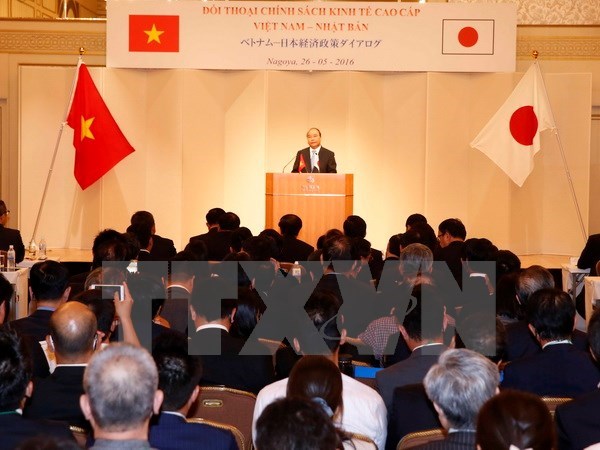
Prime Minister Nguyen Xuan Phuc attended the Vietnam-Japan high-level economic policy dialogue on May 26, right after his arrival in Nagoya city, Japan's Aichi prefecture.
 |
| Prime Minister Nguyen Xuan Phuc speaks at the Vietnam-Japan high-level economic policy dialogue. |
Prime Minister Nguyen Xuan Phuc attended the Vietnam-Japan high-level economic policy dialogue on May 26, right after his arrival in Nagoya city, Japan’s Aichi prefecture.
Addressing the dialogue, themed “Vietnam’s integration and development,” a representative from the Japanese Ministry of Economy, Trade and Industry affirmed Vietnam as Japan’s important partner, which has been proven through the regular exchange of high-ranking delegations.
About 1,500 Japanese businesses are operating in Vietnam, the official said, adding that the two countries’ approval of the Trans-Pacific Partnership (TPP) agreement will help expand bilateral cooperation in the time to come.
The Japanese side noted hope for closer ties with Vietnam, particularly in areas of Japan’s strengths like garments-textiles, energy, personnel training, and education.
Japan is ready to assist Vietnamese businesses in joining post-TPP global value chains. The country is keen to enhance collaboration with the Southeast Asian nation in infrastructure development, education and training.
At the dialogue, representatives of Japanese firms and economic organisations called on the Vietnamese Government and local authorities to step up administrative reform and facilitate the operation of Japanese businesses in the country.
In his remarks, PM Nguyen Xuan Phuc said Vietnam and Japan share a lot of similarities.
The “Extensive Strategic Partnership for Peace and Prosperity in Asia” between Vietnam and Japan is experiencing the most fruitful period ever, since the two countries established diplomatic ties, he said.
Japan is Vietnam’s largest official development assistance (ODA) provider who has contributed to the country’s infrastructure development, the leader said, citing the construction of Nhat Tan Bridge in Hanoi as the latest example of the assistance.
Japan is also Vietnam’s second largest investor with more than 3,000 projects with a total registered capital of over 39 billion USD and the country’s fourth largest trade partner, the PM added.
Briefing the Japanese side on the socio-economic achievements of Vietnam in recent times, the PM said that despite an array of difficulties and challenges, the country has still maintained its economic growth of nearly 6.7 percent, the highest level since 2011. Vietnam was one of the fastest-growing emerging markets in 2015, he noted.
The nation boasts a large population of 92 million with a per capita gross domestic product (GDP) of over 2,100 USD and a rapidly growing, stable purchasing power in Asia, he said.
He went on to say that Vietnam is among countries in the region with the highest level of political stability. The Southeast Asian country has signed 13 free trade agreements (FTA), including the Trans-Pacific Partnerhship (TPP) to which Vietnam and Japan are members.
In the near future, Vietnam will have free trade relations with 55 global partners, encompassing all the seven G7 members, and 15 out of the 20 members of the G-20 group.
The PM underlined Vietnam’s resolve to build a transparent Government to serve people and enterprises. The country is exerting every effort to improve the business climate and is striving to lead ASEAN nations in the field.
Vietnam will focus on reforming its institutions, increasing productivity and competitiveness, and restructuring the economy. A number of State-owned businesses will be equitised and join the stock market in the next three years, offering a brilliant opportunity for foreign investors – especially those from Japan – to engage in investment and become strategic shareholders, he said.
Particularly, Vietnam will push ahead with administrative reform and create a favourable business environment, he said, adding that the country aims to reach the average standards of ASEAN-4 on tax, customs, social insurance, granting construction and land licenses, and power access in 2017.
In that spirit, PM Nguyen Xuan Phuc encouraged Japanese businesses to invest in six key areas under the Vietnam-Japan industrialisation development cooperation framework, including agro-fishery processing; electronics; automobiles and auto parts; agricultural machinery; the environmental industry and energy conservation; and shipbuilding.
He also called on Japanese investors to pump money into infrastructure development projects, public-private partnerships (PPP), high-quality services, and engagement in the equitisation of Vietnamese State-owned businesses.
He also suggested sharing experience in start-up projects and developing support industry of small- and medium-sized enterprises.
According to the Vietnamese leader, the two countries are capable of raising bilateral trade to 60 billion USD by 2020.
Vietnam welcomes Japan’s opening of its market for Vietnamese fruits such as mango, lychee and dragon fruit, and hopes more made-in-Vietnam seafood, consumer goods, electrics and spare parts could enter the Japanese market.
In return, Vietnam is willing to import high-quality products and technology from Japan, the PM said.
He concluded that the success of foreign investors is also the success of Vietnam, reiterating that the Vietnamese Government will create a favourable and equal environment for overseas enterprises, including those from Japan.
(Source: VNA)





